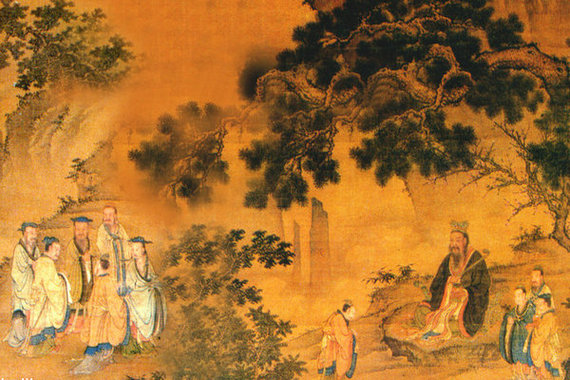What is the scientific foundation of Confucian religiosity and morality?
Look at macro-molecules, such as protein or lipid, which are the foundational components of all life, including human beings. Their 3-D bio-structures are just on point, not too complex, not too simple. They use the least amount of energy to exert optimal metabolic functioning. In other words, life is possible only if its bio-structure achieves a certain degree of energy equilibrium. In Confucianism, Mencius (孟子, approximately 372-289 BCE) teaches that human nature is good. Why good? Because without a certain degree of energy equilibrium enabling human beings to enjoy a symbiotic relationship with their environment, human beings, whether as a species or as individuals, would not have evolved.
However, according to the second law of thermodynamics and its application to biology, any closed energy system, if it is prevented from exchanging energy with its environment and from re-organizing its inner structure, will automatically lead to the increase of entropy, thus to a degree of disorder. In other words, a continuous process of energy exchange is crucial for the maintenance and self-recreation of any form of life. In Confucianism, Xunzi (荀子, approximately 313-238 BCE) teaches that human nature is bad. Why bad? Because without a continuous effort at self-cultivation and continual re-organization of the whole of human society, the co-existence of human beings and the world will also inevitably lead to chaos and disorder.
If we combine this cosmological picture and the Confucian discourse on human nature, I would say that in the cosmos, order and disorder are yin and yang; these two are co-equal, complementary to one another, and no one of them can prevail over the other in any ontological sense. To appreciate the co-existence of order and disorder in the cosmos is ultimately to worship the wonder, beauty, ineffable benevolence and unfathomable wildness of the Heavenly creation! Human beings have innate feelings (or innate knowledge, 良知) of what is good or bad. This is the result of a self-organized energy equilibrium which leads to the birth of human beings in general. However, in order to maintain the energy equilibrium and create new modes of equilibrium, human beings must continue to educate and to cultivate themselves. Otherwise, disorder will be rampant, human society will fall apart. This specific type of religiosity is called "religious naturalism," and this specific type of morality is called "humanism." Therefore, a general category for Confucianism ought to be "religious naturalism + humanistic ethics," or "humanistic ethics with a profound religious dimension of naturalistic non-theism."
If we understand the whole picture of Confucianism, we will realize what Mencius and Xunzi taught about human nature is actually not contradictory. When Mencius argues that human nature is good, the term "human nature" refers to the ways in which human beings are distinct from animals.
The telos of animal life is self-preservation, while human beings need freedom. What is more distinct about human beings is that they are able to locate themselves in an infinitely expansive network of human and human-cosmic relationships, and thus they are able to live out spiritual meanings in the use of their freedom. I would call these three dimensions of human life our animal, personal, and spiritual dimensions. In Mencius' view, the personal and spiritual dimensions of human life are manifested in the human "mind-heart" (心). If a person sees a baby falling into a well, he will spontaneously feel alarmed and distressed and, filled with empathy, he will try to save the baby. For Mencius, this feeling of commiseration (恻隐之心)is evidence for the innate potential of the human "mind-heart" to pursue what is good.
In contrast, when Xunzi talks about bad human nature, what he means is the "uncultivated" status of human beings when they are born and before they have received any education. Actually, his discussion is more about the animal dimension of human life than it is about the personal and spiritual dimensions. Although biology tells us that animals do share a certain degree of empathy towards one another, this empathy is rather limited. Understood this way, it is no surprise to see that Xunzi argues for the nature of human beings to be bad. However, Xunzi also believes that every ordinary person on the street can become a sage ("塗之人可以為禹") as long as he or she continues to cultivate him or herself and to practice ritual-propriety (禮).
In a word, Mencius and Xunzi apply differing emphases when articulating the same Confucian teachings about human nature: a human being may be good or bad, depending upon whether he or she follows an arduous process of self-cultivation so as to become better and better or not. What is most important is that though the motive and capacity to cultivate oneself may be endowed by Heaven, it is hardwired within human beings themselves. We human beings could become "good guys" by relying upon our own agency that is endowed by Heaven. In this way, Confucianism holds out a great hope for humanity!
Bin Song is also the founder of Boston University Confucian Association (www.bostonconfucianism.org) and is active in the Facebook group "Friends from afar: a Confucianism Group": https://www.facebook.com/groups/confucian.friends/

